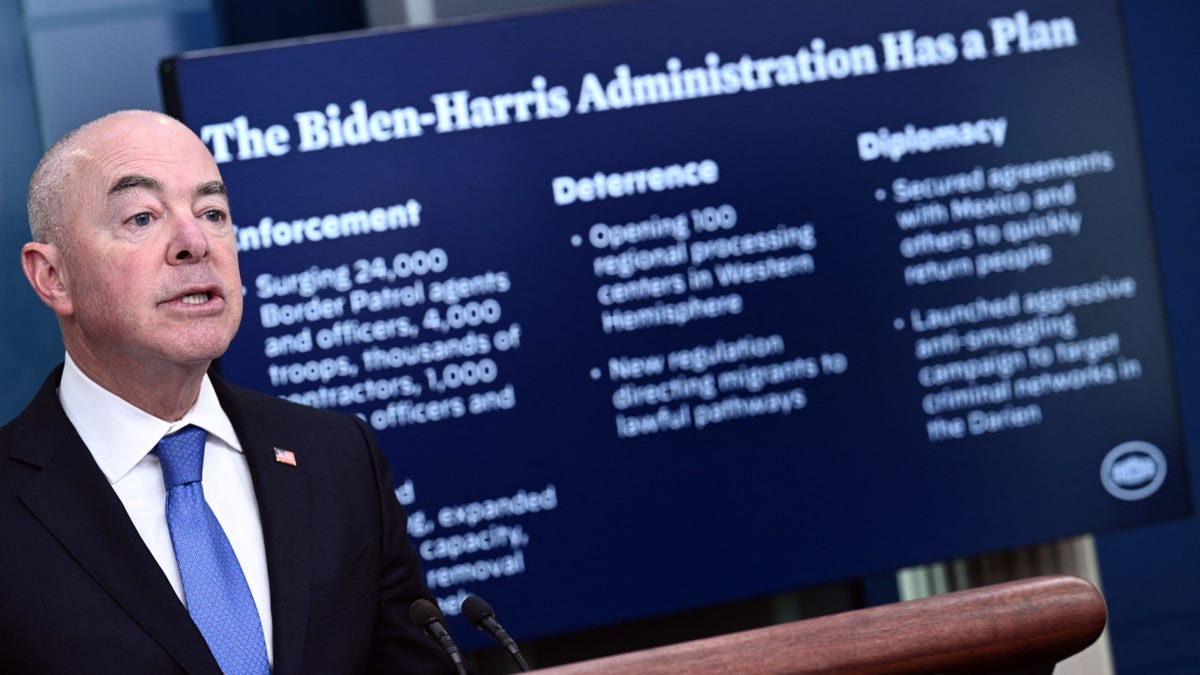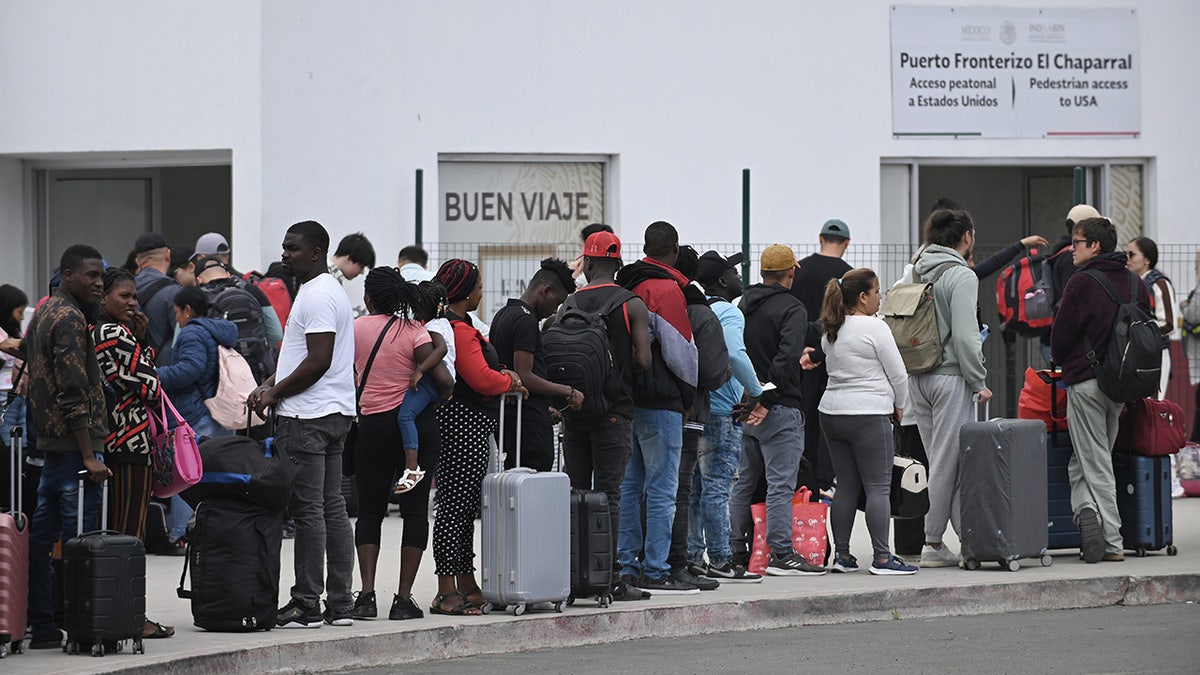The Biden administration was dealt a major blow in its efforts to control the ongoing border crisis on Tuesday when a federal judge blocked a rule introduced in May that makes migrants ineligible for asylum if they have entered illegally and failed to take advantage of expanded lawful pathways set up by the federal government.
Judge Jon Tigar of the U.S. District Court for the Northern District of California blocked the Circumvention of Lawful Pathways rule in response to a lawsuit from a coalition of left-wing immigration groups, which claimed the rule was similar to a Trump-era transit ban that was similarly blocked. He found the rule is "both substantively and procedurally invalid" and has delayed his ruling from taking effect for 14 days to give the administration time to appeal.
The rule formed the centerpiece of the administration's strategy to deal with the expiration of the Title 42 public health order in May. It presumes migrants to be ineligible for asylum if they have entered the U.S. illegally and have failed to claim asylum in a country through which they have already traveled. The administration has said it is designed to discourage irregular migration and encourage migrants to use the expanded legal pathways set up, including the use of the controversial CBP One app – which allows migrants to apply for one of the more than 1,400 appointments at a port of entry each day to be paroled into the U.S.
MIGRANT NUMBERS DROP SHARPLY IN JUNE AS BIDEN ADMIN'S POST-TITLE 42 STRATEGY TAKES SHAPE

Homeland Security Secretary Alejandro Mayorkas speaks during the daily press briefing at the White House on May 11, 2023. (Brendan Smialowski / AFP via Getty Images)
That presumption of ineligibility can be challenged if migrants can show exceptional circumstances and officials have rejected comparisons to the Trump-era travel ban. The rule also does not apply to unaccompanied minors.
The rule has formed a central cog in the Biden administration’s efforts to tackle a post-Title 42 surge, along with messaging, cooperation with NGOs and Mexico, and a stiffening of traditional Title 8 penalties. It has also set up processing centers across Central America, increased refugee admissions and set up a special parole system for up to 30,000 Cubans, Venezuelans, Nicaraguans and Haitians each month to fly into the U.S.
"Starting tonight, people who arrive at the border without using a lawful pathway will be presumed ineligible for asylum. We are ready to humanely process and remove people without a legal basis to remain in the U.S.," DHS Secretary Alejandro Mayorkas said in May. He rejected comparisons to the Trump-era transit ban, noting that the presumption of eligibility is rebuttable, unlike the Trump rule.
The rule had angered left-wing immigration activist groups, which said it was cruel and limited the ability of foreign nationals to claim asylum in the U.S. The American Civil Liberties Union (ACLU), which led the groups in the lawsuit, hailed the ruling on Tuesday.
"The ruling is a victory, but each day the Biden administration prolongs the fight over its illegal ban, many people fleeing persecution and seeking safe harbor for their families are instead left in grave danger," said Katrina Eiland, deputy director of the ACLU’s Immigrants’ Rights Project, in a statement. "The promise of America is to serve as a beacon of freedom and hope, and the administration can and should do better to fulfill this promise, rather than perpetuate cruel and ineffective policies that betray it."
Tigar, an Obama appointee, blocked the rule on the basis that the notice procedures put in place for the rule are insufficient under the Administrative Procedure Act, which determines how rules are enacted by federal agencies and requires certain notice-and-comment periods. The administration provided a 30-day notice period for the asylum rule, but Tigar deemed that to be insufficient because of the rule's complexity.

Migrants with CBP One app interviews are allowed to enter the United States at the Chaparral pedestrian border crossing on May 16, 2023, in Tijuana, Mexico. (Carlos A. Moreno / Anadolu Agency via Getty Images)
"The complexity of the Rule suggests that 30 days is unreasonable, particularly because the agencies were preparing for the end of Title 42 well before it was announced, such that they could have issued the Notice with sufficient time to grant a longer comment period and still have had the Rule in place when Title 42 expired. The agencies also did not disclose other, relevant policy changes that would affect the agencies’ reasoning for adopting the Rule, including one that controverted an assumption central to the agencies’ projection of post-Title 42 encounters at the southern border," he wrote.
HOUSE HOMELAND GOP REPORT ACCUSES MAYORKAS OF ‘INTENTIONAL’ DERELICTION OF DUTY OVER BORDER CRISIS
The ruling marks a major blow for the administration, which had pointed to a sharp drop in encounters in June from record highs seen at the beginning of May before the Title 42 order ended on May 11. It had also been dealt a blow at that time when a policy to release migrants into the U.S. without court dates was blocked after a challenge from Florida.
MAYORKAS TO TESTIFY BEFORE HOUSE JUDICIARY COMMITTEE AMID GOP SCRUTINY OVER BORDER CRISIS
Numbers in June show 144,000 migrant encounters for the month, which is the lowest number since February 2021, although still high compared to pre-2021 numbers. The administration had cited that number to show that a combination of the rule and the expansion of lawful pathways was a way to restore order at the besieged border.
The judge dismissed claims by the administration that, if the rule was blocked, there will be a return to higher encounters at the border, saying the rule "cannot remain in place, and vacating the challenged Rule would restore a regulatory regime that was in place for decades before."
The lawsuit is also facing a separate challenge from Republican-led states, which argued that the rule is a "smoke screen" to "define the problem away by re-characterizing what would be illegal crossings as ‘lawful pathways.’"
Mayorkas is scheduled to testify Wednesday before the House Judiciary Committee.
In a statement on Tuesday, he said DHS "strongly disagree[s] with today’s ruling and [is] confident that the Circumvention of Lawful Pathways rule is lawful."
He said the DOJ will appeal and seek a stay on the judge’s order. "To be clear, because the district court temporarily stayed its decision, today’s ruling does not change anything immediately," he said. "It does not limit our ability to deliver consequences for unlawful entry."
He also had a message for migrants.
"Do not believe the lies of smugglers. Those who fail to use one of the many lawful pathways we have expanded will be presumed ineligible for asylum and, if they do not have a basis to remain, will be subject to prompt removal, a minimum five-year bar on admission, and potential criminal prosecution for unlawful reentry. We encourage migrants to ignore the lies of smugglers and use lawful, safe, and orderly pathways that have been expanded under the Biden Administration."
Fox News' Bill Mears, Jacqui Heinrich and Ben Florance contributed to this report.







